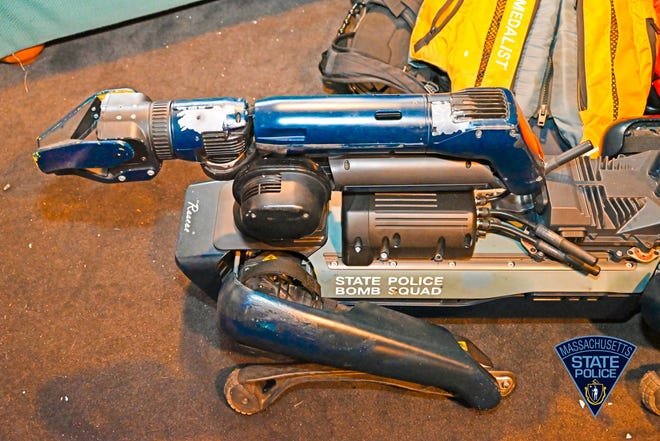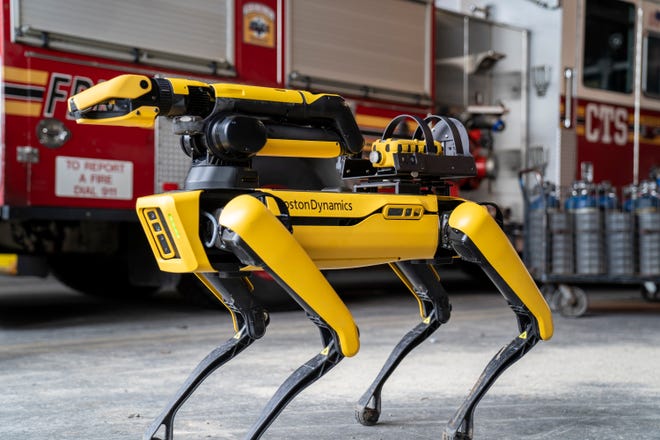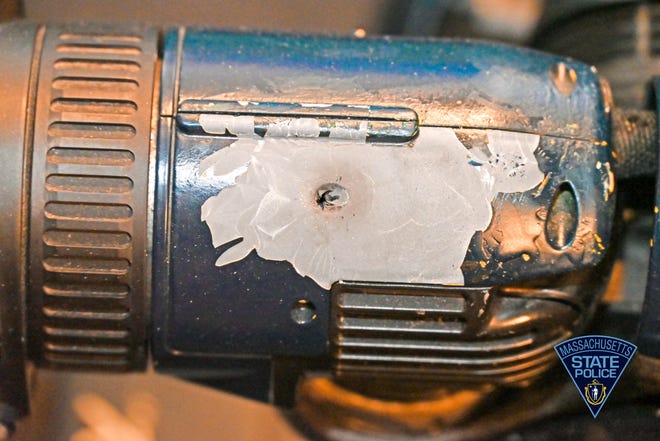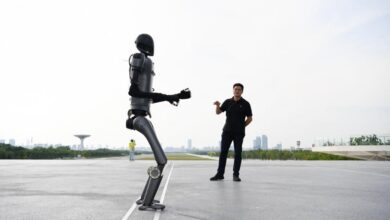New bill prevents ‘weaponized’ robot dog use by public, advocates say

On March 6 Barnstable police and a Cape Cod SWAT team surrounded a house on St. Francis Circle in Hyannis trying to convince a distraught man, barricaded inside, to surrender peacefully.
The man opened fire with a rifle, police said.
Around noon, state police arrived with three robots — including a robotic dog nicknamed Roscoe — to help bring about what was a peaceful conclusion to the seven-hour standoff.
By remote control, the robotic dog was used to inspect the basement. It encountered the armed man who knocked Roscoe over. The robot righted itself, followed the man up stairs and was again knocked over and then shot three times and disabled, according to the state police.
Boston Dynamics, the Waltham-based manufacturer of the canine robot, said it was the first instance globally of a robot in the field being shot at and damaged.
Questions surrounding the ethical use of robotic technology have been central to the development of Roscoe, which is trademarked by manufacturer Boston Dynamics as Spot.
Now, a bill in Massachusetts Legislature might see some of those concerns addressed.
‘Prohibit our customers from weaponizing the robot’
The makers of the mechanical canine have been adamantly opposed from the outset to weaponizing advanced robotic technology.
“In our terms and conditions of sale, we prohibit our customers from weaponizing the robot or using it in any way that harms or intimidates anyone,” said Brendan Schulman, vice president of policy and government relations at Boston Dynamics. As the industry has grown, he said, some people have weaponized certain robots.

In response, Schulman said Boston Dynamics is supporting policy measures ensuring the safe and ethical use of robotic technology. Last week, Spot took a trip to the Massachusetts State House to promote a bill that would prohibit the weaponization of robots and promote their responsible use.
“Lots of people loved the robot, to see it in person and have the opportunity to control it,” Schulman said. “A robot like this is not designed to be a weapon system, it really has no business being weaponized by folks out in the public.”
The bill has been sponsored by Sen. Michael Moore, D-Millbury, and Rep. Lindsay Sabadosa, D-Northampton, who could not be reached for comment. Schulman said he hoped it will pass during this current legislative session.
“We’re hoping that this Massachusetts bill becomes a model for the country,” Schulman said.
At the scene in Hyannis
On March 6 at St. Francis Circle, three robots came to life, state police said.
By remote control, two robots — PackBot 510 models — were used for surveillance.
Roscoe went into the cellar, checked and cleared a closet as safe. Then the man with a rifle emerged. Later identified as Justin Moreira, 30, the man knocked the machine over.

The man was climbing the stairs when he discovered he was being followed — by Roscoe. With the guidance from Trooper John Ragosa, Roscoe had righted itself. .
“When the suspect realized, with apparent surprise, that Roscoe was behind him on the stairs, he again knocked the robot over and then raised his rifle. The robot suddenly lost communications,” state police said in a release.
Troopers would later discover that Roscoe had been shot three times by the suspect and had been rendered inoperable, state police said.
After police fired tear gas into the home, Moreira surrendered, according to authorities. He was arraigned March 14 in Barnstable District Court on charges of kidnapping, nine counts of firearm-armed assault to murder, intimidation of a witness, three counts of carrying without a license, and nine counts of assault with a dangerous weapon (firearm).
In a press release, state police said “the incident provided a stark example of the benefits of mobile platforms capable of opening doors and ascending stairs in tactical missions involving armed suspects.”
Letting Roscoe enter the home prevented the need to use humans and avoided the chance a police officer would exchange fire with the suspect, state police said.
The day after Roscoe was filled full of lead, Ragosa took it to Boston Dynamics to remove the bullets and assess the damage, according to the state police. The company is interested in keeping Roscoe for research and state police are in the process of getting a new Spot.
Used to prevent further harm only
Schulman said even in instances where the person is a danger to others around them, robotic technology should not be used to inflict damage or cause harm. Robots like Spot should only be used to prevent further harm through non-violent means, he said.
The bill makes an exemption for military and other law enforcement personnel, such as defense contractors or police bomb squads. Although the bill allows those exceptions, Schulman said the company’s policy remains focused on non-violence.
“The focus really is on random people obtaining a robot, weaponizing it, and then putting themselves and others in harm’s way,” he said. “And of course, also damaging the image and reputation of the robotics industry, which then slows the adoption of robots.”
Walker Armstrong reports on all things Cape and Islands, primarily focusing on courts, transportation and the Joint Base Cape Cod military base. Contact him at WArmstrong@capecodonline.com. Follow him on Twitter:@jd__walker.
Thanks to our subscribers, who help make this coverage possible. If you are not a subscriber, please consider supporting quality local journalism with a Cape Cod Times subscription. Here are our subscription plans.



